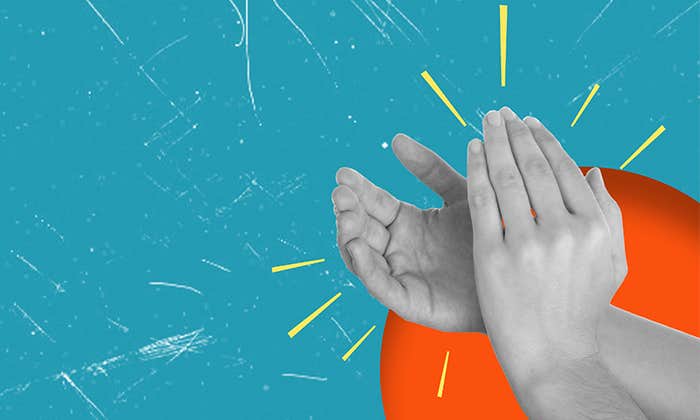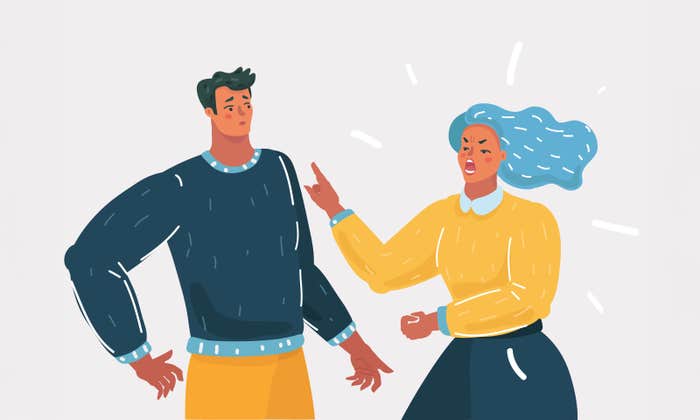One of the kids in my house feels bad for people named Karen. He announced it at the dinner table. “They’re not all annoying, or racist, or anti-vaxxer,” he said. “They don’t all demand to speak to the manager. How do you think the good Karens feel?”
I pass a plate of steamed broccoli to my partner, Amanda, and explain to all four kids that while the Karen-meme has been controversial,1 and may indeed be a misogynist tactic2 used to invalidate women’s voices, it’s not an oppressive slur. Nobody named Karen faces systematic discrimination on the basis of their birth name. So, there’s no need for him to feel bad.
He’s been watching extreme partisan politics play out on the news, reading books about race and gender, and he’s struggling to work out the nuance of who’s allowed to be a victim. Everyone claims to be silenced, censored, and canceled! Whose plight is real? It’s hard enough for the grown-ups to figure it out; imagine how confused the 13-year-olds must be. What counts as legitimate prejudice and stereotype? Where are the boundaries of cultural appropriation? When are sensitivity and tolerance required, and when is edgy humor good-natured and inoffensive? I do my best to address his concerns, to guide his thinking, because I’m a proud feminist dad and I’m trying to raise little social justice warriors. I slice into a panko-breaded chicken cutlet, remind the children to chew with their mouths closed, and reflect on how complicated fatherhood has become these days.
Bad science can become a mythology that shapes our adult lives.
According to a 2015 Pew report, 57 percent of fathers in the United States identify parenting as something “extremely important to their identity.”3 But the current conception of fatherhood is misaligned with their reality; it fails to provide men with positive aspirational models, meaningful opportunities for reflection, or the healthy psychological grounding necessary to optimally prepare their children for the 21st century. At the root of the problem is Dad’s inability to escape constrictive and outdated ideas about gender.
Take the difference between gender and sex. Gender is the word that’s often used to describe the traits, characteristics, experiences, and social expectations that are associated with identity. Sex is the word used to describe one’s biological anatomy. Many parents try to be intentional when it comes to how we represent culturally constructed gender norms with our children. We do our best to avoid sorting playtime into pink and blue categories. We try not to make stereotypical assumptions about our kids’ preferences, aptitudes, or emotional constitutions. We recognize that if we assume sex governs psychology—that boys will innately conform with certain social conventions and girls will be drawn toward others—we’re engaged in a fallacy of biological determinism.
Feminist parents are making progress. We still have a long way to go, as evidenced by the gendered toy aisles in most big box retail stores, but at least the conversation has gone mainstream. Unfortunately, we can’t say the same when it comes to Dad’s identity. Scientifically invalid assumptions about manhood continue to contour the fatherhood experience. Despite decades worth of research to the contrary, we can’t help but take it for granted that certain traits track with biological sex—as if men are from one galaxy, and women from another (I guess gender-nonconforming individuals must be either alien or lost in space).
This binary way of thinking—conflating sex with gender—is not only wrong, but also nefarious. It serves to validate male-privilege by asserting that existing inequities reflect nature. I call it “locker-room gender essentialism” because it reminds me of the so-called facts about the sexes that middle-school boys expounded on when the girls weren’t around. We were being socialized to believe that a lopsided power dynamic is immutable. Bad science can become a mythology that shapes our adult lives. Consider the entitlements that patriarchal societies bestow on men who are assertive and dominant. These behaviors are often lauded as a male evolutionary imperative. Dads are told it’s their duty to protect a clan. It’s the natural order of things, the essence of fatherhood. “Survival of the fittest” becomes an excuse for ends-justify-the-means and winner-take-all competition.
In truth, natural selection works a lot like parenting: Adaptability produces much better outcomes than rigidity. Everything you’ve heard about fixed versus growth mindset, intrinsic versus extrinsic motivation, and positive versus negative reinforcement points in this direction. Carrots work better than sticks. Spanking causes more harm than good. Shame leads to long-lasting psychological trauma. Punishments like time-out and grounding are only effective as interventions, not as a way to encourage long-term behavioral change. The old fear-based, father-knows-best, disciplinary methods don’t work. You and I turned out alright despite—not because of—Dad’s constant scolding and occasional smack.
The most familiar model of the nuclear family still includes paternal roles which are inherently patriarchal, and often misogynist.
Notwithstanding the scientific consensus, fathers still struggle to evade the intense pressure they feel to conform with outdated and sexist cultural norms. Gendered parenting expectations are not only the go-to punchlines for stand-up comedians, but also the taken-for-granted best-practices when it comes to childrearing: Mom should nurture unconditionally and Dad should withhold affection—his “tough love” mirroring the real world’s apathy and indifference. Motherhood equals abundance, fatherhood equals scarcity. Especially when it comes to raising sons, Dad still believes the Oedipal fallacy that maternal dependence must be disrupted by a reality that’s hard, cold, and mythologically masculine. A boy needs his dad to be the initiating gatekeeper to a dog-eat-dog world! As sociologist Michael Kimmel explains, “We’ve constructed the rules of manhood so that only the tiniest fraction of men come to believe that they are the biggest of wheels, the sturdiest of oaks, the virulent repudiators of femininity, the most daring and aggressive.”4
Dads perpetuate this lie each time they buy selvedge denim, bottled-in-bond bourbon, or Chromexcel leather work boots—coded signifiers of status—which subtly demonstrate commitment to an old-school masculine persona. The famous Swiss psychologist Carl G. Jung used the term “persona” to designate an individual’s outward-facing attitude. He described it as “a kind of mask, designed on the one hand to make a definite impression upon others, and, on the other, to conceal the true nature of the individual.” Jung knew that we all metaphorically dress in uniforms and costumes designed to show that we are the rightful players of the everyday parts we intend to enact. But often, we over-identify with the avatars we’ve created. We start to believe that we are what we pretend to be. “Masculinity,” author Chimamanda Ngozi Adichie wrote, “is a hard, small cage, and we put boys inside this cage.”5
You probably think I’m moving toward a familiar argument about the problems with toxic masculinity. I’m not. The truth is I find a lot of the contemporary rhetoric claiming cisgender men need more opportunities to express vulnerable emotions to be severely oversimplified. To put it crudely, it often sounds to me like a bunch of boys whining, “Somebody please, hold my balls while I cry!” Let’s be honest: If you already have unwarranted access to everything—including the authority to construct your own narrative—do you really need explicit permission to attend men’s groups, wilderness retreats, and cathartic drum circles? Isn’t that just claiming yet another privilege? An entitlement? I think so.
The toxic masculinity diagnosis was formalized in 2018, when the American Psychological Association issued its first Guidelines for Psychological Practice with Boys and Men. That document says that men are so afraid of appearing weak or “feminine” that they bury their feelings; they over-conceal. This can lead to mental health issues, cardiovascular problems, substance abuse, violence, incarceration, early mortality, and more. Surely, we’d like to avoid these negative outcomes. But the toxic masculinity framework doesn’t adequately address the specific problem that today’s fathers face.
You and I turned out alright despite—not because of—Dad’s constant scolding and occasional smack.
Economic, technological, political, and social norms are all changing. And fathers are stuck in a bind because the most familiar model of the nuclear family still includes paternal roles which are inherently patriarchal, and often misogynist. Many dads may want to see themselves as modern, evolved men. They’re legitimately concerned about gender equity. They try to be different from previous generations. In 2016, dads spent triple the number of hours per week involved in childcare as fathers did in 1965.3 They also accounted for 17 percent of all stay-at-home parents, up from 10 percent three decades earlier.
Still, research confirms that they regularly reproduce the same old sexist labor disparities at home. According to Darcy Lockman, author of the 2019 book, All The Rage: Mothers, Fathers, and the Myth of Equal Partnership, even working mothers “devote twice as much time to family care as men.” Early research suggests that this divide is widening due to pandemic pressures. But the coronavirus may just be exposing patterns that already existed. In her book, Lockman describes how expectant fathers told researchers that they anticipated their wives would shoulder more of the new childcare responsibilities. Six months in, those same dads reported that they did even less work than they initially predicted.
Even in households with older kids and teenagers, the same imbalance remains. Whether they’re married or divorced coparents, mothers are far more likely than fathers to take responsibility for envisioning, planning, organizing, managing, and executing the logistics of their children’s lives. They coordinate transportation to and from soccer games, gather supplies for school trips, keep kids focused on homework assignments, prepare for birthday parties and sleepovers, make appointments for pediatric checkups, and more, even as they hold down full-time jobs. Clearly, the requisite skills needed to accomplish all of these tasks don’t track neatly to stereotypically “feminine” competencies. But we all take the unspoken (and oftentimes spoken) sexist expectations of the patriarchal nuclear family for granted.
As Eve Rodsky, author of Fair Play: A Game-Changing Solution for When You Have Too Much to Do (and More Life to Live), puts it, Mom is considered the “she-fault” parent.6 Research confirms the bias. Fifty-three percent of Americans say that, breast-feeding aside, mothers do a better job than fathers at caring for a new baby.7 Forty-five percent say that mothers and fathers do it equally well. Only 1 percent say that fathers do it better. Folks just assume that biological sex determines one’s competence at caretaking, making little allowance for variations among individuals. Reality is more nuanced. As a 2019 paper in the Journal of Neuroendocrinology noted, “Given that primary caregiving fathers do not experience the same biological changes that primary caregiving mothers do during pregnancy, birth or lactation, it is remarkable to observe how the paternal brain may, to some degree, adapt to the demands of a primary caregiving role.”8 The “parental brain,” in other words, is more flexible than you might suppose, being “capable of adapting to the social environment in order to better assume specific caregiving responsibilities.”
Today’s young dads tend to be enthusiastic parents, but only 39 percent believe they’re doing a “very good job” raising their kids; compare that with 51 percent of mothers. Similarly, a 2017 survey found that 63 percent of fathers feel like they don’t spend enough time with their children.3 They cite work obligations as the primary obstacle. There’s fierce pressure economically, to provide for one’s family, and socially, to conform with the expectation that men be hardworking and persistent breadwinners. That’s the way we’re taught to establish our father-figure credentials. We should work weekends and overtime, ruthlessly pursuing wealth and status, to demonstrate our commitment to family.
Today’s fathers are caught in a classic case of cognitive dissonance. Two fatherly inclinations are in conflict. Inconsistent thought patterns lead to behaviors and attitudes that both serve and anguish the individual. To go all in on feminism seems to betray the customary good dad story. To go all in on the prevailing good dad story undoubtedly betrays feminism. And until we work it out for ourselves, we won’t be able to guide our children. We can’t mentor them as they work out the nuances of social injustice. We can’t model inclusive attitudes. We can’t engage them in 21st-century discourse at the dinner table. Or at least, we can’t do it as effectively as we might like until we’re willing to reimagine fatherhood as less dominant, less paternalistic, and not necessarily masculine.
Jordan Shapiro, Ph.D., is a senior fellow for the Joan Ganz Cooney Center at Sesame Workshop and Nonresident Fellow in the Center for Universal Education at the Brookings Institution. He teaches at Temple University, and wrote a column for Forbes on global education and digital play from 2012 to 2017. His new book, Father Figure: How to Be a Feminist Dad, will be released by Little, Brown Spark on May 11, 2021.
References
1. Attiah, K. The ‘ Karen’ memes and jokes aren’t sexist or racist. Let a Karen explain. The Washington Post (2020).
2. Hunt, E. What does it mean to be a “Karen”? Karens explain. The Guardian (2020).
3. Livingston, G. & Parker, K. 8 facts about American dads. PewResearch.org (2019).
4. Brod, H.W. & Kaufman, M. Theorizing Masculinity SAGE Publications, Inc., Newbury Park, CA (1994).
5. Ngozi Adiche, C. We Should All Be Feminists Anchor Books, New York, NY (2014).
6. Rodsky, E. Fair Play G.P. Putnam’s Sons, New York, NY (2019).
7. Lockman, D. All the Rage Harper, New York, NY (2019).
8. Rajhans, P., Goin-Kochel, R.P., Strathearn, L., & Kim, S. It takes two! Exploring sex differences in parenting neurobiology and behavior. Journal of Neuroendocrinology 31, e12721 (2019).
Lead art: Overearth / Shutterstock


























